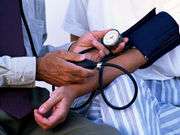For elderly patients with hypertension, the benefits and risks associated with use of antihypertensive medications should be carefully considered, according to a review published online Oct. 26 in the Journal of Internal Medicine.
(HealthDay)—For elderly patients with hypertension, the benefits and risks associated with use of antihypertensive medications should be carefully considered, according to a review published online Oct. 26 in the Journal of Internal Medicine.
Debra A. Butt, M.D., and Paula J. Harvey, M.B., B.S., Ph.D., from the University of Toronto, reviewed the literature to provide a comprehensive summary of the benefits and risks associated with use of antihypertensive medications among elderly patients (aged ≥65 years).
The researchers found that untreated hypertension is associated with increased morbidity and mortality in the elderly, and that antihypertension treatment has been shown to reduce morbidity and mortality in a small number of trials. However, elderly patients are frequently frail and have age-related comorbidities that are not linked to hypertension. The risks of falls and fractures may be increased with exacerbations of orthostatic hypotension and complications linked to polypharmacy. Issues to be considered before prescribing antihypertension treatment include the potential increased risk of cardiovascular and cerebrovascular events, possible drug class effect on insulin sensitivity or diabetes control, and the risk of development of age-related cancers.
"The concerns regarding antihypertensive drug therapy highlight the importance of primary prevention of hypertension in the elderly," the authors write. "The benefits and risks of using antihypertensive medications need to be individually assessed in hypertensive elderly patients based on the existing evidence."
More information:
Abstract
Full Text
Journal information: Journal of Internal Medicine
Copyright © 2015 HealthDay. All rights reserved.






















